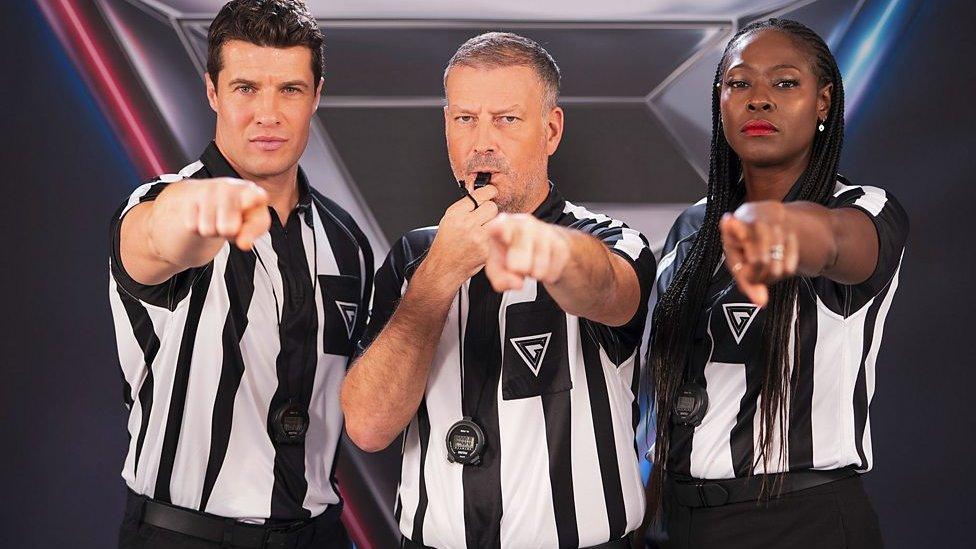Gladiators 2024: Winners crowned after grand final
- Published

Finlay and Marie-Louise were crowned champions
Finlay Anderson and Marie-Louise Nicholson have been crowned Gladiators champions after Saturday night's grand final on BBC One.
The pair beat fellow contenders, Wesley Male and Bronte Jones, to lift the coveted trophy after a competition that has lasted 11 weeks.
The reboot of the 1990s show has proved to be an audience hit.
An average of eight million viewers have tuned in each week, and a second series has been confirmed.
In the final showdown, Anderson and Nicholson raced to the top of the travelator and burst through the paper to become champions.
Anderson, an army officer, ran faster and emerged victorious after going head-to-head with wrestler Male.

The 2024 Gladiators
The 34-year-old, from Edinburgh, said it was "the most surreal moment ever" to go from being five years old and playing The Eliminator in his grandmother's living room, to "lifting the real deal".
Meanwhile, Nicholson, a personal trainer from Dublin, entered The Eliminator with a two-second head start on Sheffield firefighter Jones and kept her lead in the race to the top.
"Bronte was on my tail the whole time, what a competitor to go up against, she was so close to the end there. I think we're both winners in my eyes," the 28-year-old told host Bradley Walsh.
The series, which was filmed at Sheffield Arena, launched 16 new Gladiators, including Sabre, Legend, Giant and Diamond, who have become fan favourites.
Over the course of 11 weeks, they have been competing against the contenders in classic events such as Duel and the Eliminator.
Anderson said the hardest part of the final was The Edge, a challenge in which contenders and Gladiators chase each other on an elevated grid, as he had injured his ribs in that event in the quarter-finals and "didn't want to get hurt again".
Nicholson's least favourite game was Duel, in which participants have to knock their opponents off a podium. "I'm quite petite and not as strong as some of the Gladiators," she said. "They had great stability and knock you straight on the head."

Earlier this week, the BBC announced in its annual plan that Gladiators will return to Sheffield Arena for a second series.
"It has been wonderful to hear how much families have loved watching this together," said Kalpna Patel-Knight, the BBC's head of entertainment.
She added: "We can't wait for more action from the Gladiators."
Keeping the original format has been key to the show's success, media experts have said.
"When you watch Gladiators, it's exactly the same as it was in the 1990s, in terms of the challenges, the music and the eliminations," Tom Harrington, an analyst at the media research firm Enders Analysis, told the BBC.
Mr Harrington said some other revived shows have failed because they've "been tinkered with" to the point they end up losing what made them good originally.
"With Gladiators, the producers understood what made it great to watch in the first place, and they've not messed with that at all," he added.
First broadcast on ITV on 10 October 1992, Gladiators was like nothing seen before in the prime time Saturday slot.
The Lycra-clad combatants, including Wolf, Warrior, Shadow and Cobra, became household names, while contenders took on an exhausting array of challenges.
The show ran on the network until 2000, before being resurrected by Sky between 2008 and 2009.
The BBC began showing the current series this January, with father and son duo Bradley and Barney Walsh presenting.
Compared with when Gladiators started in the 1990s - when there were only a handful of TV slots - there is much more competition for viewers' attention now.
But it has been one of the most successful TV reboots in recent years, with the opening episode attracting an audience of nearly 10 million, including 28-day catch-up figures.
Mr Harrington said the Gladiators reboot had achieved a rare feat of getting families to come together on a Saturday night to watch TV.
"It's a declining phenomenon," he said. "Especially when you consider that younger viewers are moving away from TV to short-form video or streaming services.
"But here you have a show that's on at a particular time slot, and people [have tuned] in."
Related topics
- Published3 February 2024

- Published27 January 2024

- Published11 January 2024
